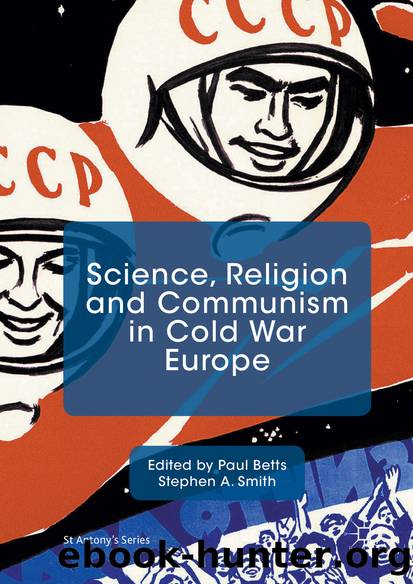Science, Religion and Communism in Cold War Europe by Paul Betts & Stephen A. Smith

Author:Paul Betts & Stephen A. Smith
Language: eng
Format: epub
Publisher: Palgrave Macmillan UK, London
This seemingly oxymoronic connection between âRussian spiritual identityâ and humanityâs place in the cosmos continues to vivify a new post-socialist generation of Russian intellectuals.70
Conclusion
When the first young hero cosmonauts flew into space in the early 1960s, Soviet commentators repeatedly depicted them as emblematic of a modern and technologically sophisticated Russia, overtaking the West. And unlike American astronauts who thanked God for their successes, Soviet cosmonauts were avowedly atheistic; one of the first cosmonauts, the young German Titov, famously declared on a visit to the USA that during his 17 orbits of the Earth, he had seen âno God or angelsâ, adding that âno God helped build our rocketâ.71 As Victoria Smolkin-Rothrock has shown, such exclamations reinforced an alignment between space exploration and campaigns to inculcate atheism among the Soviet population.72 They also whitewashed âinconvenientâ phenomena dating back to the 1920s when the founding theorist of Soviet space exploration, Tsiolkovskii, was actively writing about space travel in ways that could not conform to orthodoxies about the role of science and technology in post-World War II Soviet society. An article entitled âCosmonautics versus Religionâ in 1959, for example, could confidently argue that atheism provided the spark for cosmic conquest and that Tsiolkovskii was at the vanguard of this movement.73 Yet, despite these efforts, through the height of Soviet space exploits during the Cold War, Tsiolkovskiiâs mystical ideas loomed as an echo of an earlier time.
It is undoubtedly true that when the first space theorists, enthusiasts, and practitioners were articulating a vision for the future of cosmic travel, they were drawing from the modernist and quasi-utopian ideas emerging from particular scientific and technical disciplines rooted in post-Enlightenment rationalism. Expressions of this cult of modern science and technology took the form of fiction (Jules Verne) or popular science (Iakov Perelman) or engineering marvels (e.g. the airplane). All of the principal actors who translated Soviet populist cosmic enthusiasm into the machines that put the first Soviet satellites and cosmonauts into orbit, have paid explicit debt to this tradition. Lest we suspect that they were âhidingâ their true motivations, among the literally hundreds of memoirs about the Soviet space program churned out in the 1990sâmany of them highly critical of the Soviet state, Stalin, and Marxism in generalâremarkably, not a single one hints that the inspiration to aspire for the cosmos was anything but an outcome of a national and cultural commitment to be the best in science and technology.
Yet, while the cult of modern science in the twentieth century inspired these actors, it is also undeniable that the central figure at the very root of grand narrative of the Soviet space program, Tsiolkovskii, was deeply influenced by mystical and occult epistemologies. In fact, at the very moment, the 1920s, when the first mass cosmic enthusiasm emerged in Soviet culture, there was a concomitant if less widespread interest in various mystical and metaphysical notions about the cosmic setting of humanity. The existence of this particular historical strand in the early twentieth century is further complicated by
Download
This site does not store any files on its server. We only index and link to content provided by other sites. Please contact the content providers to delete copyright contents if any and email us, we'll remove relevant links or contents immediately.
| Africa | Americas |
| Arctic & Antarctica | Asia |
| Australia & Oceania | Europe |
| Middle East | Russia |
| United States | World |
| Ancient Civilizations | Military |
| Historical Study & Educational Resources |
Magic and Divination in Early Islam by Emilie Savage-Smith;(1534)
Papillon by Henry Charrière(1442)
Bohemians, Bootleggers, Flappers, and Swells: The Best of Early Vanity Fair by Bohemians Bootleggers Flappers & Swells- The Best of Early Vanity Fair (epub)(1419)
Ambition and Desire: The Dangerous Life of Josephine Bonaparte by Kate Williams(1394)
Twelve Caesars by Mary Beard(1324)
What Really Happened: The Death of Hitler by Robert J. Hutchinson(1167)
Operation Vengeance: The Astonishing Aerial Ambush That Changed World War II by Dan Hampton(1164)
London in the Twentieth Century by Jerry White(1149)
The Japanese by Christopher Harding(1134)
Time of the Magicians by Wolfram Eilenberger(1131)
Twilight of the Gods by Ian W. Toll(1123)
Lenin: A Biography by Robert Service(1080)
The Devil You Know by Charles M. Blow(1028)
A Social History of the Media by Peter Burke & Peter Burke(985)
Freemasons for Dummies by Hodapp Christopher;(966)
Napolean Hill Collection by Napoleon Hill(949)
Henry III by David Carpenter;(924)
The Rise and Triumph of the Modern Self by Unknown(923)
Richard III (The English Monarchs Series) by Charles Ross(913)
